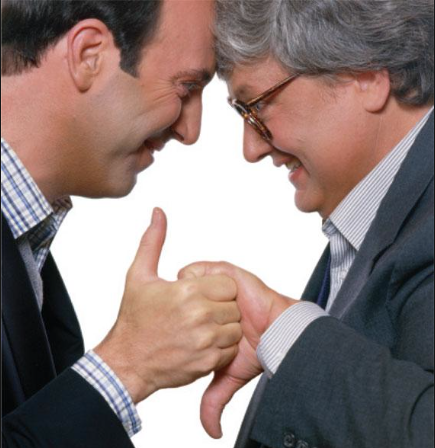We didn't get a chance to say goodbye
Author: Dick Bolles

February 25, 1999
Gene Siskel died last week. You probably heard. He was 53. Left a wife and three children.
The news made me very sad. For years, a guest in my living room (and maybe yours) every week, along with his compadre and rival, Roger Ebert. And now he's gone, along with his famous critical thumb.
My sadness is not because he died – though I feel, deeply, for his wife, and children.
But from the time I was a child, my mother taught me to believe in a compassionate God. She underlined: "Believe in..." The creed in our church (Episcopal), she said, did not say "I believe there is a God," but: "I believe in God..." – in the same way you believe in a loved one, even when 'appearances' cause others to falter in their trust.
Life, she said, is about learning to trust God, despite appearances. Trusting Him even about death.
Understanding Death
I have walked with death a lot, since then. I've learned death often comes without any warning. My best friend, Stan Rodgers, died of a sudden heart attack during a service at Grace Cathedral, where he was Dean. My only brother, the reporter Don Bolles, was assassinated, by men who put a bomb under his car, in Phoenix 23 years ago. My 58 year old son, Mark, died a couple of years ago—unexpectedly, after a minor operation.
Such experiences convinced me that death is an act of God's mercy, despite any appearances to the contrary. Let me explain. Suppose a car manufacturer came out tomorrow with a car bearing this proven guarantee – "No matter how bad an accident you are ever in, no matter how damaged or crushed this car may become, we will always be able to extricate you, and get you out, without a scratch" – think how people would flock to buy that car!
In my view, our soul is already in such a "car," namely our body, and death comes when it is time for God to carry out that guarantee. That's how I see Gene's death: his body was broken and could no longer serve his soul, and so God rescued his soul from that body.
I am not pressing this belief on you, dear reader. I am merely explaining why it is not alone the fact that Gene died, that makes me sad.
Waiting Too Long
The source of my personal sadness lies elsewhere. It lies in the fact that he died before we had a chance to tell him how much he meant to us.
I wish we had known how near death he was, so that we might have showered him with cards, letters, and e-mail, telling him how much we appreciated him, how much he had lightened our lives with his weekly visit to our living rooms, with his droll humor, his interplay with Roger, his exasperation and gentle smile.
Years ago, when I went to the funeral of my friend Stan, I sat with a friend of his and mine. We three had had lunch together just three days before Stan died. She had been crying, and by way of explanation she said, "I didn't know I wouldn't get a chance to say goodbye."
Life/work 'Planning'
I've never forgotten those words. I happen to teach "life/work planning." That is my field, and expertise – what my writings are all about.
The emphasis in "life/work planning" is not on the word "planning," but on the word "life." It's all about studying and understanding "life" – beginning with that famous sentence, "Life is what happens while you're making other plans."
The first great learning is how unpredictable life is, how we have only so much time and it is rarely enough. As the mug that sits on my desk says, "God put me on Earth to accomplish a certain number of things. Right now I'm so far behind I will never die."
That's the case for most of us. Ergo, we need priorities for how we spend the limited time that we have. "Life/work planning" is the science of examining and reordering those priorities. It has two basic applications for us, here.
The first refers to priorities: Spend less time on making money, and spend more time on love, compassion, and appreciation.
The second refers to action: Think of those who you care about in this life, those whom you appreciate. And then, do something about it. Find time, make time, to tell them so. Whether they are near or far. Give it priority. Tell everyone in your life whom you value just how much you appreciate them – now.
And if it's too late – they're gone, and you left things unsaid – then speak those things now, to the wind, to heaven, and to them.
Something like: "Thanks, Gene, for all those years of pleasure. I'm sorry we didn't get a chance to say goodbye."
And, I felt the same way, only more so, when his long time partner/rival, Roger Ebert, died. Boy, will I miss those two!!